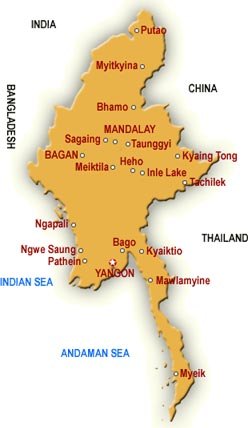Myanmar's "sham" referendum ratifies new constitution
 Yangon - Myanmar's controversial referendum - held on May 10 in the wake of the destruction wrought by Cyclone Nargis - overwhelmingly ratified a new constitution cementing the military's political power, as expected, state media reported Thursday.
Yangon - Myanmar's controversial referendum - held on May 10 in the wake of the destruction wrought by Cyclone Nargis - overwhelmingly ratified a new constitution cementing the military's political power, as expected, state media reported Thursday.
The Commission for Holding Nationwide Referendum announced that 20.7 million people, or 92.4 per cent of some 22.5 million people who voted in the referendum last Saturday, voted in favour of the constitution, according to state radio reports.
Myanmar's military rulers pushed through the referendum Saturday intended to cement their political power despite international appeals to postpone the vote in the wake of Cyclone Nargis, which has killed up to 130,000 people and left another 2 million people in need of food, water, shelter and medical aid.
Although the junta postponed the vote to May 24 in 47 of the townships worst-hit by the cyclone, including much of the former capital Yangon, it rejected international appeals to delay the controversial referendum and concentrate on providing emergency relief.
There are altogether 325 townships in Myanmar, a country of 57 million people.
The referendum, held without international monitors, has been cited as one of the reasons the military was reluctant to allow in foreign international aid workers last week to facilitate a multi-million-dollar disaster relief programme for the country.
"They didn't want you to be in there to witness what they are doing inside Burma," said Lian Sakhong, secretary-general of the Ethnic Nationalities Council, one of many rebel organizations based along the Thai-Myanmar border.
"You would have been able to witness the cheating at the referendum, which was reported to be huge," Sakhong told a press conference in Bangkok.
The referendum process, held under the strict control of Myanmar's military masters, has been called a sham by human rights activists and Western democracies for being neither free nor fair.
The regime used both intimidation and vote-buying to assure the populace voted yes, observers said. In February the ruling junta passed a law that outlawed public criticism of the constitution.
Scores of opposition politicians were arrested under the law for urging people to vote no.
Many civil servants, including teachers, soldiers, police, and members of the Union Solidarity and Development Association (USDA) - the military's mass organization - were required to cast their votes in advance, and most were told by their bosses to vote yes, sources said. Others were enticed to do so.
In the weeks leading up to the referendum, Myanmar's military made clear through billboard and media campaigns that they expected the people to vote yes.
The referendum was on a new constitution, drafted by a military-appointed forum, which will essentially allow the military control over future elected governments through a system of appointees in both the upper and lower legislative houses.
Myanmar has been under military rule for the past 46 years. The current junta has promised a general election in 2010, but given its constitutional control over both houses, prospects for true democracy remain dim. (dpa)